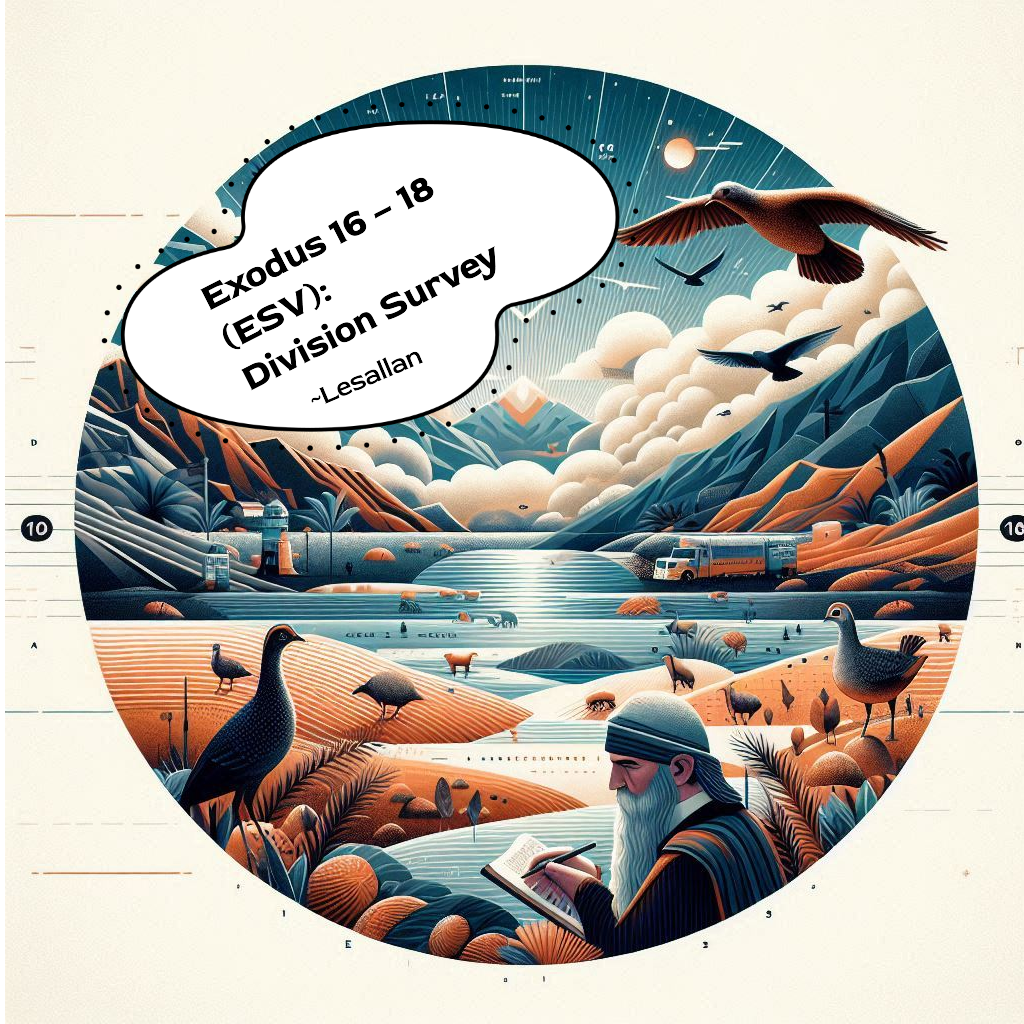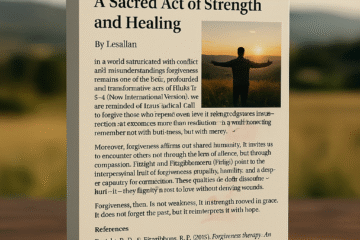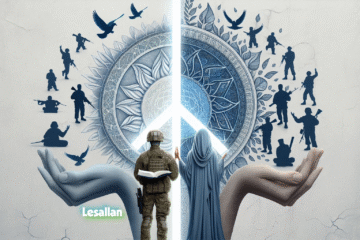By Lesallan – September 12, 2024

Exodus 16 – 18 (ESV): Division Survey
Version: ESV
Major Structural Relationships
Observation
The provision of manna and quail (Exodus 16, ESV) demonstrates God’s provision and the Israelites’ dependence on Him.
How does the provision of manna test the Israelites’ obedience?
The provision of manna in the wilderness was a test of the Israelites’ obedience and dependency on the divine provider. As described in Exodus 16:4-5 (ESV), they were instructed to gather only what they needed for each day, except on the sixth day when they were allowed to gather twice as much in preparation for the Sabbath. This act not only demonstrated the Israelites’ trust in God’s provision, but also served as a reminder of the importance of rest and honoring the Sabbath. It was a lesson in faithful obedience and reliance on God’s care for their daily needs.
What is the significance of the Sabbath in this context?
The Sabbath holds deep significance as a day of rest and trust in God’s provision, serving to reinforce the covenant relationship between God and the Israelites. This sacred day is rooted in the teachings found in Exodus 16:23-30 (ESV), illustrating the importance of honoring God and finding spiritual rejuvenation through rest and reflection.
Observation
The battle with Amalek (Exodus 17:8-16, ESV) highlights God’s protection and the importance of intercession.
How does Moses’ intercession impact the battle?
In the book of Exodus, we witness Moses’ powerful intercession during a battle. His physical act of raising his hands symbolizes his dependence on God. As long as his arms were raised, the Israelites would have the upper hand, but when he grew tired and lowered them, the enemy gained ground. This powerful imagery serves as a profound reminder of the importance of relying on God for victory. It highlights the principle that true success comes through trust and dependence on a higher power. This biblical account not only illustrates the significance of intercessory prayer, but also the overarching message of placing our trust in God for triumph in our own lives (Exodus 17:11-13, ESV).
What is the significance of the altar named “The Lord Is My Banner”?
The altar, as described in the book of Exodus 17:15-16 in the ESV version of the Bible, holds great significance as it symbolizes God’s continual protection over His people. It stands as a powerful reminder of His unwavering presence and divine strength in the midst of the Israelites’ numerous battles and challenges. This visual representation of God’s faithfulness and support serves to inspire hope, courage, and resilience in the face of adversity, echoing its profound spiritual and symbolic importance throughout the ages.
Observation
Jethro’s advice to Moses (Exodus 18, ESV) emphasizes the need for delegation and wise leadership.
How does Jethro’s advice improve the governance of the Israelites?
Jethro’s advice, as mentioned in Exodus 18:21-22 (ESV), to appoint capable leaders over groups of thousands, hundreds, fifties, and tens is a timeless principle that promotes effective and efficient governance. By distributing the burden of leadership across multiple capable individuals, the practical implementation of this advice ensures that the needs and concerns of all members within the community are addressed. This hierarchical structure not only facilitates better decision-making but also promotes a sense of inclusivity and empowerment among the people. Furthermore, it allows for a more organized and streamlined approach to governance, where responsibilities are clearly defined and leadership is able to focus on specific areas of influence, ultimately leading to a more harmonious and progressive society.
What does this passage teach about the role of the community in leadership?
In Exodus 18:17-23 (ESV), the passage teaches us that effective leadership involves collaboration and delegation. Here, Jethro advises Moses to appoint capable leaders to help him judge the people, thus demonstrating the importance of recognizing the strengths and contributions of the community. This passage highlights that a successful leader understands the significance of sharing responsibilities and empowering others. It emphasizes the need for the wise delegation, acknowledging the diverse skills and talents within the community, and fostering a collaborative environment where everyone’s strengths can be utilized for the whole community’s benefit.
Outline
I. Provision of Manna and Quail (Exodus 16, ESV)
A. God’s Promise of Provision (Exodus 16:1-12, ESV)
B. The Giving of Manna and Quail (Exodus 16:13-21, ESV)
C. Instructions for the Sabbath (Exodus 16:22-30, ESV)
D. Preservation of Manna (Exodus 16:31-36, ESV)
II. The Water from the Rock and the conflict (battle) with Amalek (Exodus 17, ESV)
A. Behold the water from the Rock at Rephidim (Exodus 17:1-7, ESV)
B. Battle with Amalek (Exodus 17:8-13, ESV)
C. The Altar Named “The Lord Is My Banner” (Exodus 17:14-16, ESV)
III. Jethro’s Visit and Advice (Exodus 18, ESV)
A. Jethro’s Arrival and Observation (Exodus 18:1-12, ESV)
B. Jethro’s Advice on Leadership (Exodus 18:13-23, ESV)
C. Implementation of Jethro’s Advice (Exodus 18:24-27, ESV)
Literary forms
In Exodus 16-18, which is written in the ESV translation, the predominant literary form is prose narrative. This form is used to convey historical events and God’s direct interactions with the Israelites. The text includes specific instructions about gathering manna and observing the Sabbath (Exodus 16:4-5, 23-30, ESV). Furthermore, it presents historical accounts of the battle with Amalek and Jethro’s visit, emphasizing theological truths about God’s provision, protection, and the significance of wise leadership (Exodus 17:8-16, 18:1-27, ESV).
The literary forms found in Exodus 16-18 (ESV), particularly prose narrative, are still prevalent today. In modern contexts, literary forms serve various purposes. Prose narrative, for example, continues to be a prominent feature in storytelling through mediums such as novels, biographies, and historical accounts. Its ability to effectively convey events, experiences, and lessons makes it a powerful tool for contemporary authors. Additionally, instructional texts, reminiscent of specific instructions in texts like Exodus (ESV), are prevalent in modern literature. These instructional materials include how-to guides, manuals, and self-help books, offering practical advice and guidance to readers navigating their daily lives.
One such theme is ‘dependence on God ‘, a recurring motif in many modern religious texts and sermons. This theme advocates for believers to place their trust in a higher power for their needs and challenges, echoing the counsel Jethro gave to Moses about the delegation. This advice holds relevance in today’s organizational and leadership contexts, encouraging influential and effective leaders to empower their teams through the delegation of task to achieve collective goals.
Throughout history, these literary forms and themes have persisted due to their ability to capture and reflect timeless and universal human experiences and values. Their enduring relevance lies in their deep connection to the core of the human condition.
Other major impressions
- The recurring theme of God’s provision, whether through the miraculous provision of manna in the desert, bringing forth water from a rock, or granting victory in battles, is a powerful reminder of His unwavering faithfulness and deep care for His people. This provides comfort and assurance, showing that God’s love and provision are constant, regardless of the circumstances.
- The Israelites’ experiences in the Old Testament serve as a powerful reminder of the significance of obedience and trust in God’s commands and His appointed leaders. Through their journey, we learn the profound impact of heeding divine guidance and placing our trust in the wisdom of God’s chosen authorities. This underscores the idea that obedience and faith are pivotal in navigating life’s challenges and experiencing the fullness of God’s plan.



3 Comments
thedeadlines · September 15, 2024 at 9:14 am
I simply could not go away your web site prior to suggesting that I really enjoyed the standard info a person supply on your guests Is going to be back incessantly to investigate crosscheck new posts
streameast · September 16, 2024 at 6:05 pm
Its like you read my mind You appear to know a lot about this like you wrote the book in it or something I think that you could do with some pics to drive the message home a little bit but instead of that this is fantastic blog An excellent read I will certainly be back
trendaddictor · September 18, 2024 at 10:59 am
Hi i think that i saw you visited my web site thus i came to Return the favore I am attempting to find things to improve my web siteI suppose its ok to use some of your ideas
Comments are closed.